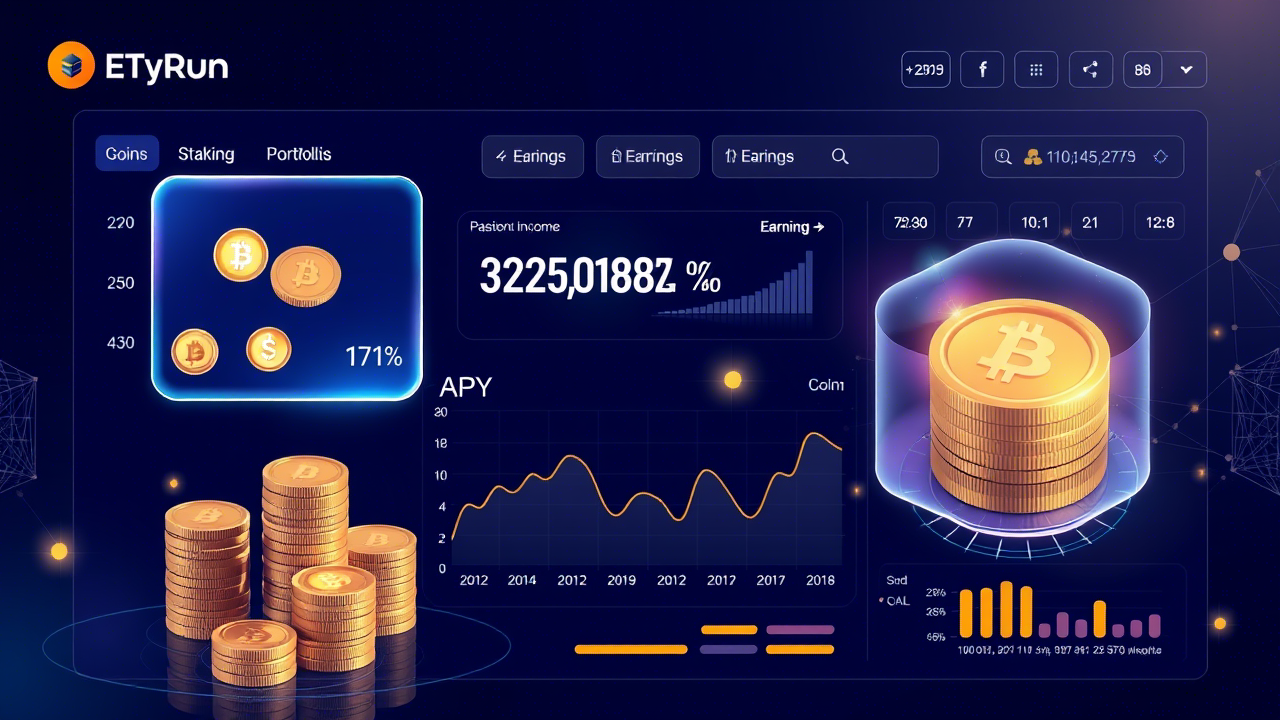The investment landscape has transformed dramatically as traditional financial markets embrace digital asset innovation. Crypto ETF investment represents a revolutionary bridge between conventional investing approaches and the dynamic world of cryptocurrency markets. This comprehensive guide explores how exchange-traded funds focused on digital assets are reshaping investment portfolios across global markets.
Exchange-traded funds targeting cryptocurrency markets offer investors exposure to digital asset price movements without the complexities of direct cryptocurrency ownership. These investment vehicles combine the regulatory oversight of traditional securities with the growth potential of blockchain-based assets, creating unprecedented opportunities for both institutional and retail investors.
The emergence of crypto ETF products addresses long-standing concerns about cryptocurrency security, custody, and regulatory compliance while maintaining the potential for significant returns that have attracted millions of investors to digital asset markets worldwide.
Understanding Crypto ETF Fundamentals
Exchange-traded funds focused on digital assets operate through established financial market infrastructure while providing exposure to cryptocurrency price movements. These investment vehicles purchase and hold various forms of cryptocurrency exposure, including direct digital asset holdings, cryptocurrency futures contracts, or shares in companies with significant blockchain operations.
Unlike traditional mutual funds, crypto ETF products trade on established stock exchanges during regular market hours. This structure provides investors with familiar trading mechanisms while accessing the volatile and potentially lucrative cryptocurrency market through regulated financial instruments.
The regulatory framework surrounding these investment products ensures investor protections similar to traditional securities, including disclosure requirements, custody standards, and oversight by financial regulatory authorities. This regulatory structure addresses many concerns that have prevented institutional investors from direct cryptocurrency investments.
Professional fund management teams handle the technical aspects of cryptocurrency storage, security protocols, and portfolio rebalancing, removing these operational burdens from individual investors while maintaining exposure to digital asset price movements.
Bitcoin ETF Revolution
Bitcoin exchange-traded funds represent the most significant development in cryptocurrency investing since the creation of digital assets themselves. These investment vehicles provide direct exposure to Bitcoin price movements through regulated securities that trade on traditional stock exchanges.
The approval and launch of Bitcoin ETF products marked a watershed moment for cryptocurrency acceptance in mainstream financial markets. Major financial institutions can now offer clients Bitcoin exposure through familiar investment structures that comply with existing regulatory frameworks and fiduciary responsibilities. According to CoinMarketCap, Bitcoin ETF launches have contributed to increased institutional adoption and market liquidity.
Bitcoin ETF structures vary significantly, with some funds holding actual Bitcoin in secure custody arrangements while others use derivative instruments like futures contracts to track Bitcoin price movements. Each approach offers different risk profiles, expense ratios, and correlation patterns with underlying Bitcoin prices.
Investment in Bitcoin ETF products eliminates many practical barriers that have prevented widespread Bitcoin adoption, including technical wallet management, private key security, and the complexity of cryptocurrency exchange operations. Investors can purchase Bitcoin ETF shares through existing brokerage accounts using traditional order types and settlement procedures.
The success of Bitcoin ETF launches has paved the way for additional cryptocurrency-focused exchange-traded funds covering broader digital asset markets, sector-specific applications, and diversified cryptocurrency portfolios.
Cryptocurrency ETF Investment Strategies
Successful cryptocurrency ETF investment requires understanding both traditional portfolio management principles and the unique characteristics of digital asset markets. These investment vehicles offer several strategic approaches for incorporating cryptocurrency exposure into diversified investment portfolios.
Core holding strategies treat cryptocurrency ETF positions as long-term portfolio allocations similar to other asset classes. This approach typically involves allocating a predetermined percentage of total portfolio value to cryptocurrency ETF positions while maintaining exposure through various market cycles and volatility periods. Understanding crypto investment strategies helps optimize long-term performance.
Tactical allocation strategies adjust cryptocurrency ETF positions based on market conditions, technical analysis, or macroeconomic indicators. This more active approach requires ongoing market monitoring and may involve higher transaction costs but potentially offers superior risk-adjusted returns during favorable market conditions.
Diversification across multiple cryptocurrency ETF products can provide exposure to different digital assets, investment strategies, or regional markets. Some funds focus exclusively on Bitcoin, while others offer broader cryptocurrency market exposure or specific blockchain application areas.
Risk management considerations for cryptocurrency ETF investment include position sizing appropriate to individual risk tolerance, understanding correlation patterns with traditional asset classes, and maintaining adequate liquidity for portfolio rebalancing activities.
Comprehensive Crypto ETF Guide
Navigating the expanding universe of cryptocurrency exchange-traded funds requires understanding product structures, investment objectives, and operational characteristics that distinguish these investment vehicles from traditional securities.
Product research begins with reviewing fund prospectuses that outline investment objectives, portfolio holdings, fee structures, and risk factors specific to cryptocurrency markets. These documents provide essential information for making informed investment decisions and understanding how each fund achieves cryptocurrency market exposure. Investors should also explore top crypto apps for portfolio monitoring and research tools.
Expense ratio analysis is crucial for long-term investment performance, as management fees can significantly impact returns over extended holding periods. Cryptocurrency ETF expense ratios vary widely based on fund complexity, asset management requirements, and competitive positioning within the market.
Liquidity considerations include both the trading liquidity of ETF shares on stock exchanges and the underlying liquidity of cryptocurrency markets. High trading volumes and tight bid-ask spreads indicate healthy secondary market activity and efficient price discovery mechanisms.
Performance evaluation should consider tracking accuracy relative to underlying cryptocurrency benchmarks, volatility patterns, and correlation with broader cryptocurrency markets. Some funds may experience tracking errors due to management fees, cash holdings, or derivative instrument characteristics.
Digital Asset ETF Portfolio Integration
Digital asset exchange-traded funds offer portfolio diversification benefits that extend beyond traditional asset class correlations. These investment vehicles can provide exposure to technological innovation, alternative monetary systems, and emerging digital economy applications.
Modern portfolio theory applications to digital asset ETF allocation suggest optimal position sizes based on expected returns, volatility characteristics, and correlation coefficients with existing portfolio holdings. Academic research indicates cryptocurrency allocations between three and ten percent may optimize risk-adjusted portfolio returns.
Asset allocation frameworks incorporating digital asset ETF positions must consider the higher volatility characteristics typical of cryptocurrency markets. Position sizing should reflect individual risk tolerance while maintaining portfolio stability during adverse market conditions.
Rebalancing strategies for portfolios containing digital asset ETF positions require careful consideration of tax implications, transaction costs, and market timing factors. Systematic rebalancing approaches may help maintain target allocations while potentially capitalizing on cryptocurrency market volatility.
Integration with traditional portfolio management systems requires understanding how digital asset ETF positions interact with existing equity, fixed income, and alternative investment allocations during various market scenarios. Learning blockchain technology fundamentals helps investors better understand the underlying technology driving these investment opportunities.
Crypto ETF India Market Analysis
The Indian cryptocurrency exchange-traded fund market represents significant potential for growth despite evolving regulatory frameworks surrounding digital asset investments. Indian investors increasingly seek exposure to cryptocurrency markets through regulated investment vehicles that comply with local securities regulations.
Regulatory developments in India continue shaping the availability and structure of cryptocurrency-focused investment products. Current regulatory frameworks require careful navigation while maintaining compliance with securities laws and taxation requirements applicable to Indian investors.
International cryptocurrency ETF products may be available to qualified Indian investors through global investment platforms, though this access depends on regulatory approvals and compliance with foreign investment regulations applicable to Indian residents.
Domestic mutual fund companies and asset managers continue evaluating opportunities to launch India-specific cryptocurrency investment products, pending regulatory clarity and approval processes from securities regulators.
The growing Indian investor interest in cryptocurrency markets suggests strong potential demand for domestically available cryptocurrency ETF products once regulatory frameworks provide clear guidance for product development and marketing.
Global Crypto ETF Share Price Dynamics
Cryptocurrency exchange-traded fund share prices reflect underlying digital asset value movements while incorporating premium and discount patterns typical of exchange-traded fund structures. Understanding these price dynamics is essential for effective investment timing and execution strategies.
Intraday trading patterns in cryptocurrency ETF shares often mirror underlying cryptocurrency market movements, though differences in trading hours between traditional stock exchanges and cryptocurrency markets can create temporary pricing inefficiencies and arbitrage opportunities.
Market makers and authorized participants play crucial roles in maintaining pricing efficiency between ETF share prices and underlying asset values through creation and redemption mechanisms. These processes help minimize sustained premiums or discounts that could impact investor returns.
Volatility characteristics of cryptocurrency ETF share prices typically correlate strongly with underlying digital asset volatility while potentially exhibiting additional volatility during periods of significant market stress or regulatory uncertainty.
International cryptocurrency ETF products may exhibit different pricing patterns based on local market conditions, regulatory environments, and currency exchange rate fluctuations that affect underlying asset valuations.
Comprehensive Crypto ETF List Analysis
The expanding universe of cryptocurrency exchange-traded funds offers investors diverse options for accessing digital asset markets through regulated investment vehicles. Current market offerings include products focused on individual cryptocurrencies, broad market indices, and specialized blockchain application areas.
Bitcoin-focused ETF products represent the largest category, offering direct Bitcoin exposure through various structural approaches including spot Bitcoin holdings, futures-based strategies, and Bitcoin mining company equity positions. Each structure provides different risk-return characteristics and correlation patterns with Bitcoin prices.
Broad cryptocurrency market ETF products provide diversified exposure across multiple digital assets, often weighted by market capitalization or alternative indexing methodologies. These funds offer exposure to cryptocurrency market development while reducing concentration risk associated with individual digital assets.
Blockchain technology ETF products focus on publicly traded companies involved in blockchain development, cryptocurrency mining, or digital asset services. These equity-based funds provide indirect cryptocurrency exposure through traditional stock market investments.
Thematic cryptocurrency ETF products target specific applications or use cases within digital asset markets, such as decentralized finance protocols, non-fungible token platforms, or Web3 infrastructure development.
Leading Provider Analysis: Crypto ETF Vanguard Perspective
Vanguard’s approach to cryptocurrency exchange-traded fund development reflects the company’s commitment to low-cost, diversified investment solutions while maintaining conservative risk management standards appropriate for long-term investors.
The investment management giant’s evaluation of cryptocurrency market opportunities focuses on product structures that align with Vanguard’s core principles of cost efficiency, broad diversification, and regulatory compliance within established financial market frameworks.
Vanguard’s research into cryptocurrency ETF products emphasizes understanding long-term investment merit, correlation characteristics with traditional asset classes, and structural considerations that affect investor outcomes over extended holding periods.
Product development considerations include expense ratio optimization, tracking accuracy relative to underlying cryptocurrency benchmarks, and integration with existing Vanguard portfolio management platforms and advisory services.
The company’s cautious approach to cryptocurrency ETF development reflects broader institutional perspectives on digital asset investing while acknowledging growing investor demand for regulated cryptocurrency exposure options.
Latest Crypto ETF News and Developments
The cryptocurrency exchange-traded fund market continues evolving rapidly with new product launches, regulatory developments, and institutional adoption driving significant industry growth and innovation.
Recent regulatory approvals have expanded the range of available cryptocurrency ETF products, including direct spot Bitcoin ETF options that hold actual cryptocurrency assets rather than derivative instruments. These approvals represent significant victories for cryptocurrency market development and institutional acceptance.
Major asset management companies continue announcing cryptocurrency ETF product development plans, suggesting robust pipeline growth for additional investment options across various digital asset categories and investment strategies.
Institutional adoption metrics indicate growing acceptance of cryptocurrency ETF products among pension funds, endowments, and other large institutional investors who previously avoided direct cryptocurrency investments due to regulatory or operational constraints.
Performance data from existing cryptocurrency ETF products provides valuable insights into tracking accuracy, expense impact, and correlation patterns that inform future product development and investor allocation decisions.
Crypto ETF Approval Process and Regulatory Framework
The regulatory approval process for cryptocurrency exchange-traded funds involves extensive review procedures by securities regulators who evaluate product structures, risk management protocols, and investor protection measures.
Securities and Exchange Commission approval requirements include detailed prospectus documentation, custody arrangements for underlying assets, market making agreements, and comprehensive risk disclosure statements that inform investors about cryptocurrency market characteristics.
International regulatory approaches to cryptocurrency ETF approval vary significantly across different jurisdictions, with some countries adopting more permissive frameworks while others maintain restrictive policies regarding cryptocurrency-based investment products.
Ongoing regulatory developments continue shaping the cryptocurrency ETF market structure, including evolving guidance on taxation, reporting requirements, and operational standards applicable to fund management companies and service providers.
The approval process timeline for new cryptocurrency ETF products typically extends several months to years, depending on regulatory complexity, product innovation, and evolving policy frameworks governing digital asset investments.
United States Crypto ETF Market Leadership
The United States cryptocurrency exchange-traded fund market represents the largest and most developed ecosystem for digital asset investment products, driven by regulatory clarity and robust institutional demand.
Major U.S. asset management companies have launched numerous cryptocurrency ETF products following regulatory approvals, creating competitive market dynamics that benefit investors through improved product features and reduced expense ratios.
The American cryptocurrency ETF market encompasses various product structures including spot Bitcoin ETFs, futures-based strategies, and equity-focused funds targeting blockchain technology companies and cryptocurrency mining operations.
Institutional adoption within the United States has accelerated following cryptocurrency ETF approvals, with pension funds, insurance companies, and registered investment advisors incorporating these products into client portfolios and institutional investment strategies.
Market infrastructure supporting U.S. cryptocurrency ETF products includes established custody solutions, market making arrangements, and regulatory oversight frameworks that provide investor confidence and operational efficiency.
Crypto ETF Investment Fundamentals
Understanding fundamental investment principles specific to cryptocurrency exchange-traded funds is essential for making informed allocation decisions and managing portfolio risk effectively within this emerging asset class.
Valuation methodologies for cryptocurrency ETF products must consider underlying digital asset pricing mechanisms, premium and discount patterns relative to net asset value, and correlation characteristics with broader cryptocurrency markets and traditional asset classes.
Risk assessment frameworks for cryptocurrency ETF investment encompass market risk from underlying digital asset volatility, operational risk from fund management and custody arrangements, and regulatory risk from evolving policy frameworks governing cryptocurrency markets.
Performance measurement considerations include tracking error analysis relative to underlying cryptocurrency benchmarks, expense impact on long-term returns, and correlation stability across different market environments and volatility regimes.
Due diligence processes for cryptocurrency ETF selection should evaluate fund management experience, operational infrastructure, regulatory compliance history, and alignment between investment objectives and investor goals.
Best Crypto ETF Selection Criteria
Identifying optimal cryptocurrency exchange-traded fund investments requires systematic evaluation of multiple criteria that affect long-term investment outcomes and portfolio integration effectiveness.
Expense ratio comparison across available cryptocurrency ETF options reveals significant cost differences that can substantially impact investment returns over extended holding periods. Lower expense ratios generally improve net returns, though investors should consider total cost of ownership including trading expenses.
Tracking accuracy relative to underlying cryptocurrency benchmarks indicates fund management effectiveness and structural efficiency. Funds with minimal tracking error typically provide more predictable exposure to intended cryptocurrency market movements.
Liquidity analysis encompasses both ETF share trading liquidity on stock exchanges and underlying cryptocurrency market liquidity that affects fund operations. High liquidity generally supports better price discovery and reduced trading costs.
Management team experience and operational infrastructure quality affect fund performance through portfolio management decisions, operational efficiency, and risk management capabilities during various market conditions.
Is There Any ETF for Crypto Investment Options?
The cryptocurrency exchange-traded fund market has expanded significantly, offering investors multiple options for accessing digital asset markets through regulated investment vehicles that trade on traditional stock exchanges.
Current market offerings include various cryptocurrency ETF products with different structural approaches, from direct cryptocurrency holdings to futures-based strategies and blockchain technology equity investments. These options provide investors with diverse methods for incorporating cryptocurrency exposure into investment portfolios.
Geographic availability of cryptocurrency ETF products varies across different regulatory jurisdictions, with some markets offering extensive product selections while others maintain more restrictive policies regarding cryptocurrency-based investment vehicles.
Product innovation continues expanding the range of available cryptocurrency ETF options, including new strategies focused on specific digital assets, investment themes, or risk management approaches that address evolving investor preferences and market conditions.
Investor access to cryptocurrency ETF products typically requires standard brokerage accounts with firms that offer exchange-traded fund trading capabilities, making these investments accessible through existing financial service relationships.
How to Buy Crypto ETF in India: Step-by-Step Guide
Purchasing cryptocurrency exchange-traded funds in India requires understanding current regulatory frameworks, available product options, and investment procedures applicable to Indian residents seeking digital asset exposure.
Current regulatory environment in India affects the availability of domestic cryptocurrency ETF products, though international options may be accessible through qualified investment platforms and global brokerage services that serve Indian investors.
Account setup procedures for accessing cryptocurrency ETF investments typically involve opening investment accounts with brokerages that offer international market access or specialized platforms focused on alternative investment products.
Research and due diligence processes should evaluate available cryptocurrency ETF options based on investment objectives, risk tolerance, expense considerations, and regulatory compliance requirements applicable to Indian investors.
Investment execution requires understanding order types, market timing considerations, and settlement procedures specific to cryptocurrency ETF products, which may differ from traditional securities trading processes.
Ongoing portfolio management includes monitoring performance, rebalancing considerations, and tax implications specific to cryptocurrency ETF investments held by Indian residents.
Top 3 ETF Recommendations Analysis
Identifying the leading cryptocurrency exchange-traded funds requires evaluating performance metrics, structural efficiency, and alignment with investor objectives across the expanding universe of available products.
Performance analysis encompasses return characteristics, volatility patterns, and correlation stability relative to underlying cryptocurrency markets and traditional asset classes over various time periods and market conditions.
Structural evaluation considers fund management approaches, expense ratios, tracking accuracy, and operational efficiency factors that affect long-term investment outcomes and portfolio integration effectiveness.
Risk assessment frameworks evaluate concentration risk, operational risk, and regulatory risk associated with different cryptocurrency ETF structures and underlying asset exposures.
Competitive positioning analysis examines how leading cryptocurrency ETF products differentiate themselves through unique investment strategies, cost structures, or specialized market exposures that appeal to different investor preferences.
BlackRock Crypto ETF Market Impact
BlackRock’s entry into cryptocurrency exchange-traded fund markets represents a watershed moment for digital asset investing, given the firm’s position as the world’s largest asset management company with extensive institutional relationships.
The investment giant’s cryptocurrency ETF development reflects growing institutional acceptance of digital assets as legitimate investment opportunities worthy of professional portfolio management and regulatory oversight.
BlackRock’s approach to cryptocurrency ETF product design emphasizes institutional-grade operational infrastructure, comprehensive risk management frameworks, and regulatory compliance standards that align with the firm’s traditional asset management practices.
Market impact from BlackRock’s cryptocurrency ETF launches includes increased institutional investor interest, enhanced product credibility, and competitive pressure on other asset managers to develop comparable cryptocurrency investment offerings.
The firm’s extensive distribution capabilities and institutional relationships provide significant advantages for cryptocurrency ETF product adoption among pension funds, endowments, and other large investors who previously avoided cryptocurrency markets.
Crypto ETF Price Performance Analysis
Cryptocurrency exchange-traded fund price performance reflects underlying digital asset market movements while incorporating structural factors specific to exchange-traded fund operations and market dynamics.
Historical performance analysis reveals correlation patterns between cryptocurrency ETF prices and underlying digital asset markets, though correlation strength may vary during different market conditions and volatility regimes.
Volatility characteristics of cryptocurrency ETF prices typically mirror underlying cryptocurrency market volatility while potentially exhibiting additional volatility during periods of market stress or structural changes in fund operations.
Premium and discount patterns relative to net asset value provide insights into market efficiency and arbitrage opportunities that may affect investment timing and execution strategies.
Comparative performance analysis across different cryptocurrency ETF products reveals the impact of structural differences, expense ratios, and management approaches on investor returns over various time periods.
Reddit Community Insights on Crypto ETF
Online investment communities, particularly Reddit forums, provide valuable insights into cryptocurrency exchange-traded fund investor sentiment, experiences, and emerging trends that may not be captured in traditional financial analysis.
Community discussions reveal practical investor experiences with cryptocurrency ETF products, including trading execution, performance observations, and integration challenges within existing portfolio management strategies.
Sentiment analysis from Reddit cryptocurrency and investing communities provides real-time feedback on market perceptions, regulatory developments, and product innovations affecting cryptocurrency ETF markets.
Educational content shared within Reddit communities helps democratize cryptocurrency ETF knowledge, providing accessible explanations of complex concepts and practical investment guidance for retail investors.
Community-driven research and analysis often identifies emerging trends, potential opportunities, and risk factors that may not be immediately apparent through traditional financial media and research sources.
Future Outlook for Crypto ETF Markets
The cryptocurrency exchange-traded fund market outlook suggests continued growth driven by institutional adoption, regulatory clarity, and expanding product innovation across global markets.
Regulatory developments are expected to provide additional clarity and potentially expand the range of permissible cryptocurrency ETF structures, including more direct cryptocurrency holdings and broader digital asset exposures.
Product innovation pipeline includes specialized cryptocurrency ETF strategies focused on specific blockchain applications, regional markets, and risk management approaches that address evolving investor preferences and market maturity.
Institutional adoption trends indicate growing acceptance of cryptocurrency ETF products among traditional investment managers, suggesting potential for significant asset inflows and market expansion over coming years.
Global market development suggests increasing international coordination and standardization of cryptocurrency ETF regulatory frameworks, potentially expanding investor access and product availability across different jurisdictions.
Risk Management in Crypto ETF Investment
Effective risk management for cryptocurrency exchange-traded fund investment requires understanding unique risk factors associated with digital asset markets and implementing appropriate portfolio management strategies.
Market risk encompasses the high volatility characteristics typical of cryptocurrency markets, which can result in significant short-term portfolio value fluctuations that may exceed those experienced with traditional asset classes.
Operational risk considerations include fund management quality, custody arrangements for underlying cryptocurrency assets, and technological infrastructure supporting fund operations and investor access.
Regulatory risk reflects the evolving policy environment governing cryptocurrency markets and investment products, which may affect fund operations, taxation, and investor access to cryptocurrency ETF products.
Liquidity risk encompasses both the trading liquidity of ETF shares and underlying cryptocurrency market liquidity, which may affect fund operations during periods of market stress or significant investor redemptions.
FAQ
What exactly is a crypto ETF and how does it work?
A crypto ETF is an exchange-traded fund that provides exposure to cryptocurrency markets through regulated investment vehicles trading on traditional stock exchanges. These funds either hold actual cryptocurrencies, invest in cryptocurrency futures contracts, or purchase shares of companies involved in blockchain technology, allowing investors to gain digital asset exposure without directly owning cryptocurrencies.
Are crypto ETFs safer than buying cryptocurrency directly?
Crypto ETFs offer several safety advantages including regulatory oversight, professional custody solutions, and elimination of technical risks associated with wallet management and private key security. However, they still carry market risk from cryptocurrency price volatility and may have additional costs through management fees and potential tracking errors relative to underlying digital asset prices.
Can I buy crypto ETFs through my regular brokerage account?
Yes, most crypto ETFs trade on traditional stock exchanges and can be purchased through standard brokerage accounts using familiar order types and settlement procedures. This accessibility makes cryptocurrency investing available through existing investment relationships without requiring specialized cryptocurrency exchange accounts or technical knowledge.
What are the tax implications of investing in crypto ETFs?
Crypto ETF investments are typically taxed as securities rather than direct cryptocurrency holdings, potentially simplifying tax reporting requirements. However, tax treatment may vary based on jurisdiction, holding periods, and specific fund structures, so investors should consult tax professionals for guidance applicable to their individual circumstances.
How do crypto ETF expense ratios compare to traditional ETFs?
Crypto ETF expense ratios generally range from 0.75% to 2.50% annually, which is higher than typical broad market index ETFs but competitive with actively managed funds and specialty sector ETFs. These fees reflect the additional operational complexity and specialized expertise required for cryptocurrency market exposure and management.
Final Thought
Crypto ETF investment represents a revolutionary convergence of traditional financial markets and digital asset innovation, offering investors regulated pathways to cryptocurrency exposure through familiar investment structures. As the market continues maturing with expanded product offerings, regulatory clarity, and institutional adoption, these investment vehicles are becoming essential tools for modern portfolio diversification.
The transformation from speculative cryptocurrency trading to regulated ETF investing reflects the broader evolution of digital assets from experimental technology to legitimate asset class worthy of professional management and institutional allocation. This shift opens cryptocurrency markets to a broader investor base while maintaining the growth potential that has attracted millions to digital asset investing.
Success in crypto ETF investment requires understanding both traditional portfolio management principles and unique characteristics of cryptocurrency markets, including volatility patterns, correlation dynamics, and regulatory developments that continue shaping this emerging investment landscape. Through careful research, appropriate risk management, and strategic portfolio integration, crypto ETF products offer compelling opportunities for investors seeking exposure to the digital transformation of global financial systems.












Leave a Reply